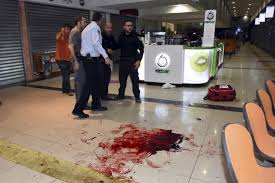Israeli Mob Attacks Dying Refugee After Soldier Is Killed
Warning: Graphic details, videos and images

(ELECTRONIC INTIFADA): Warning: This article contains video and images of extreme violence.
A gunman opened fire at the central bus station in Bir al-Saba (Beer Sheva), a city in the south of present-day Israel, on Sunday evening, killing an Israeli soldier and wounding up to 11 other people.
The assailant shot and killed a soldier and then “snatched his M-16 rifle” before opening fire on the others, most of whom were “members of Israel’s security forces,” Israel’s Ynet reported. Walla! News reported that four of the injured were soldiers.
Israeli police shot and killed the assailant.
Israeli media named the dead soldier as 19-year-old Sergeant Omri Levi. He was a member of the Israeli army’s Golani brigade.
There has been confusion and contradictory reports regarding the identity of the assailant.
Both Reuters and Ynet, citing Palestinian media, claimed he was Isam al-Araj from Shuafat, a neighborhood in occupied East Jerusalem whose Palestinian residents have frequently been targeted with violence by Israeli occupation forces and settlers. This information had not been confirmed by any official source. It was also not apparent which Palestinian media had reported the claim.
The Jerusalem Post later claimed that the Israeli army had named the attacker as Muhannad Al-Okabi, from the Bedouin town of Hura in the southern Naqab (Negev) region of present-day Israel. The same name was reported in other Israeli media, including Maariv.
Death-chanting mob
During the incident, a security guard shot 29-year-old Haftom Zarhum, an Eritrean refugee who was “misidentified” as a “terrorist,” according to Haaretz. Zarhum later died of his injuries.
Zarhum came to Beer Sheva on Sunday to procure a visa.
Video captured by bystanders and posted to social media shows a mob of onlookers, including Israeli soldiers and police, kicking Zarhum in the head, pinning him under a chair and throwing a bench at him as he writhes on the floor, clearly in pain and bleeding severely.
Voices from the crowd can be heard chanting for Zarhum’s death, shouting “mehabel” (terrorist), “Kill him!” and “Break his head! Break his head! Son of a prostitute!”
Ynet reported that medics trying to evacuate Zarhum “ran into objection from the crowds at the scene, who blocked their way and called out ‘Death to Arabs,”Arabs out!’ and ‘Am Israel Chai’ (‘The people of Israel still live’).”
Haaretz correspondent Chaim Levinson tweeted a statement from an Israeli police spokesperson implying Zarhum might have been shot because of his race.
“I haven’t touched a word. The Police spokesman’s (Negev region) statement: One of the wounded persons, who was shot by security forces, is a foreign citizen; at the moment it is not clear if he is involved with the event or if he was shot due to his exterior appearance,” Levinson wrote.
Non-Jewish refugees from African states regularly experience extreme racism and hostility in Israel.
Israeli leaders have labeled them a “demographic threat” to Israel’s Jewish majority, as they have Palestinians. They are at constant risk of indefinite detention and deportation.
During preliminary questioning, the security guard who shot Zarhum was quoted by the Israeli news site Maariv, stating: “I was sure he was the terrorist, he wasn’t hiding like everyone else.”
“I saw him running toward me and not hiding like the others, so I shot him,” added the security guard.
However, another video of the incident, widely shared on social media, appears to show the shooting of Zarhum. It flatly contradicts the security guard’s account.
In the video, a man can be seen crawling on all fours, clearly posing no threat to anyone and likely trying to escape to safety, when a man with a handgun approaches and shoots him.
The shooting victim is then seen writhing on the floor in a similar position to the video showing Zarhum being attacked by the mob.
In both videos, the shooting victim is lying near the set of orange chairs used to attack Zarhum and near a dark line on the floor.
No one offers him medical assistance.
There have been other recent examples of such lynch mob behavior, including before and after the summary execution of Fadi Alloun, a Palestinian youth in Jerusalem, on 4 October. These mob killings come amid a growing chorus of incitement by Israeli leaders, who have openly encouraged vigilante revenge against Palestinians following stabbing attacks that have left seven Israelis dead.
Last week, a video captured Israelis screaming “Die you son of a prostitute!” at Ahmad Manasra as the Palestinian 13-year-old lay covered in blood and gasping on the ground. The boy and his cousin Khalid Manasra who was killed, were accused of involvement in a stabbing that injured two Israelis in the settlement of Pisgat Zeev.
Since 1 October Israeli forces have killed at least 42 Palestinians, many in what nine human rights groups condemned as “extrajudicial killings” of alleged attackers and Palestinian demonstrators.
Gag order
The Israeli government has placed a gag order on all aspects of the police investigation into the bus station attack until 18 November.
The gag order, which was leaked on social media, prohibits media from sharing “any detail about the investigation,” “any detail that could identify the suspects,” and “the fact of the existence of the investigation.”
The Israeli news site Walla! News confirmed that a “sweeping gag order” was in effect.
The withholding of the gunman’s identity and the subsequent gag on any details that could identify him is peculiar. The Israeli government typically wastes no time publicizing the name, possible criminal record and political affiliation of suspected Palestinian attackers. Whatever the reason, the details will emerge soon enough.
What is also all but certain is that the Israelis who attacked and perhaps ultimately killed Zarhum are not likely to held accountable. Their families will not be subjected to punitive home demolitions and other forms of collective punishment that Israel reserves exclusively for Palestinians.
Dena Shunra provided Hebrew translation and Ali Abunimah contributed reporting.
(ELECTRONIC INITIFADA)



